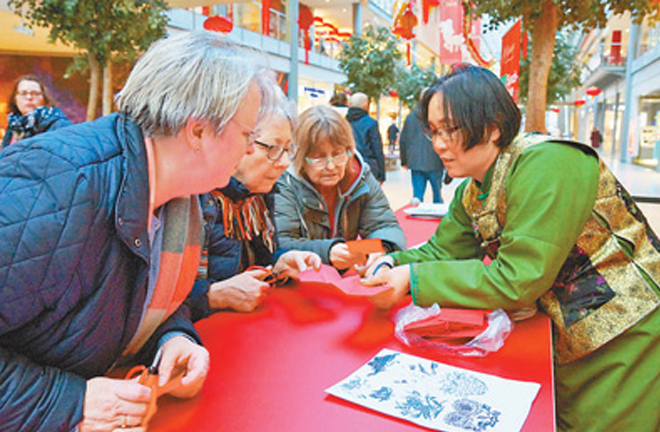Exchanges key to building soft power

Germans learn about Chinese paper-cutting during the Happy Spring Festival celebrations held in Berlin on Feb. 1. (PEOPLE’S DAILY)
An annual research report on improving cultural soft power and enhancing international influence was released by the National Academy of Development and Strategy at Renmin University of China in Beijing on March 30. The report examines the development of China’s cultural soft power from such dimensions as foreign cultural exchanges, international cultural communication and trade.
In regard to foreign cultural exchanges, China’s overseas cultural platforms and brand building have been intensified. For example, more than 500 Confucius Institutes have been established in foreign countries and regions. The number of China Cultural Centers abroad had reached 35 by the end of 2017.
The overseas dissemination of Chinese culture has begun to take shape. In recent years, a batch of excellent movies and TV series have gone abroad. A large number of quality books are selling well overseas. Martial arts, exhibitions of cultural relics and folk crafts have entered the international market.
The pace of “going out” is also accelerating in terms of international cultural trade. Cultural services are accounting for a growing share of China’s service exports. In 2016, the export of cultural services accounted for 3.1 percent of the total export of China’s services, up 0.7 percent over the previous year.
Fan Yugang, a professor from the Faculty of Humanities at the Party School of the Central Committee of the CPC, said that the cultural soft power strategy stresses cultural construction and strengthening cultural charm domestically while emphasizing cultural communication capability and international influence abroad. Currently, it is particularly necessary to build cultural soft power. A sound and efficient cultural operation system as well as cultural innovation ability determines the promotion of a country’s cultural soft power, Fan said.
Mao Peiqi, a professor from the School of History at Renmin University of China, said that China has the rich resources needed to construct cultural soft power, including traditional and socialist culture. Cultural elements with distinct Chinese characteristics as well as universal human values can be extracted from these resources to aid in the construction of cultural soft power, Mao said.
MAO LI is a correspondent with Chinese Social Seciences Today.
(edited by YU HUI)

 PRINT
PRINT CLOSE
CLOSE